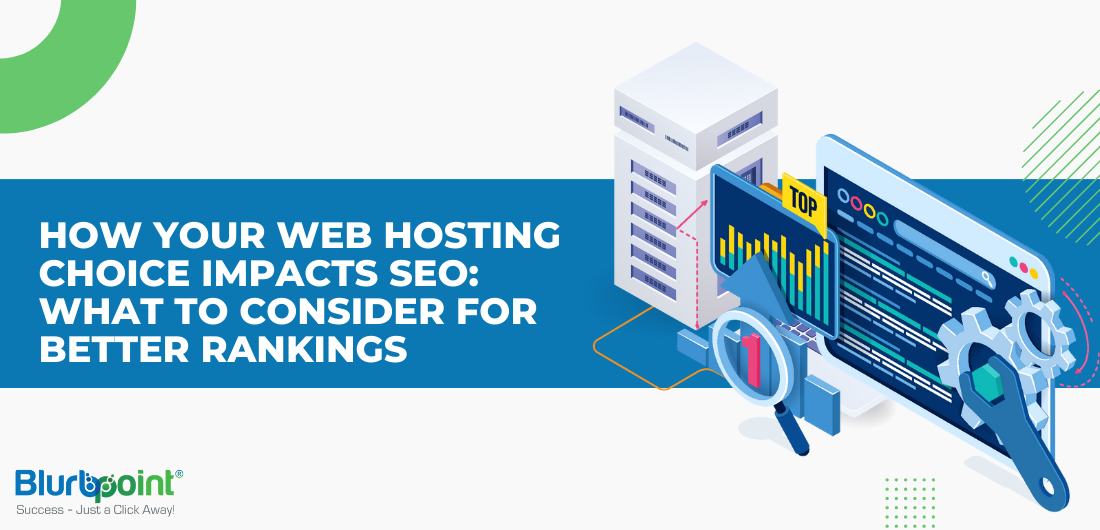GET A FREE CONSULTATION



Posted by blurb-developer
October 15, 2024
When it comes to SEO, most website owners concentrate on content creation, keyword optimization, and building backlinks. These elements are undoubtedly essential, but one critical factor often gets overlooked: web hosting.
The quality of your web hosting can significantly influence your website’s performance, user experience, and, ultimately, your search engine rankings. Here, quality means the page speed, uptime, storage, security, and hosting location. Understanding the relationship between SEO and hosting is important.
Search engines have a specific algorithm that helps your website rank higher. SEO is an important aspect that helps you follow the algorithm and enhance your website’s visibility on SERPs.
A higher ranking on search result pages means more visibility and organic traffic. Studies revealed that the first page of Google captures 90% of the traffic, dramatically boosting organic traffic if your website is at the top.
Additionally, the websites on top of search results are often considered credible and authoritative. This trust can lead to higher conversion rates and more user engagement. Getting organic traffic is also a cost-effective solution because now you are not spending any money on paid marketing to get traffic.
Web hosting is the center point of your website because all your website data is stored on it. That is why selecting the best web hosting is crucial to taking advantage of SEO strategies. Here is how different factors and aspects of web hosting affect SEO.
Page speed is an important ranking factor for desktop, mobile, or tablet searches. Faster-loading websites provide a smooth user experience, leading to higher engagement and lower bounce rates.
Always focus on dedicated or Virtual Private Server (VPS) hosting. Shared hosting with multiple sites on the same server resource will lead to slower loading times and website errors, especially during peak traffic times. Most hosting providers offer a variety of plans to suit different needs. For example, Hostinger’s range of plans makes it easier to find one tailored to your business requirements, as they provide various pricing tiers and performance features.
Hosting must provide SSD storage instead of old HDD storage as SSDs are more efficient than old HDDs and take less data processing time. Additionally, you must ensure your web hosting has an integrated CDN (Content Delivery Network), which distributes your content across multiple global servers, ensuring fast delivery to the user regardless of location.
Security is crucial for protecting your data and maintaining your site’s SEO and health. Most search engines prioritize secure websites, and Google clearly stated that HTTPS is a ranking signal.
You must ensure that your web hosting provider has SSL certificates to enable HTTPS on your website. Moreover, advanced security features like regular malware scans and real-time intrusion detection help protect your site from cyber threats. Eliminating DDoS attacks to ensure your site remains accessible during any traffic spikes.
You might be thinking about how server location can affect your website. The physical location of your hosting affects your website’s loading speed and time in different locations. Hosting closer to your targeted audience reduces that loading time, improves user experience, and boosts local SEO.
Moreover, if you have a business that targets a specific location, having hosting nearby can boost rankings, and you will be prioritized in the search results. So, if you are planning a business or blog website for a specific audience in a specific location, we recommend you buy hosting near that location and, in the best case, in that location.
Web Hosting must be scalable, which means that if your website grows, your storage needs will also grow. A scalable hosting will allow your website to handle increased traffic without compromising performance. One of the major benefits of scalable hosting is that you can upgrade your server resources, like CPU, RAM, storage, etc, to accommodate your data and traffic.
Moreover, scalable hosting distributes the traffic across multiple servers to prevent a single server from bottlenecks. Cloud hosting providers often provide flexible scaling options, ensuring your site remains SEO-friendly despite sudden traffic or rapid growth.
During the traffic spike, your web hosting plays an important role. If they have enough resources, then they will manage the traffic without causing your website to slow down or crash. However, your website will negatively impact SEO if they don’t have methods to handle website traffic spikes. We highly recommend you choose hosting that provides traffic spike management.
These web hosting automatically adjust their resources based on your traffic to make a smoother user experience with no page speed issues. They auto-distribute traffic across multiple servers to maintain optimal performance. Ensure your web host can handle large data transfer volumes without throttling speed.
Selecting a web hosting to get higher rankings in search results and enjoy a traffic boost is crucial. Most modern hosting sites are up to the mark, but you must still be careful about your selection. Here’s a list of things you should remember when selecting a hosting company.
This list of “Must-Haves” will help you choose your hosting to rank higher and take advantage of the SEO strategies you are implementing on your website.
Selecting the right web hosting is important for the SEO. From page speed and uptime to security and server location, your hosting choice directly impacts your website’s search engine rankings. You must choose the hosting wisely to get ranked on any search engine. You can benefit from SEO strategies if your hosting selection criteria match the described list.